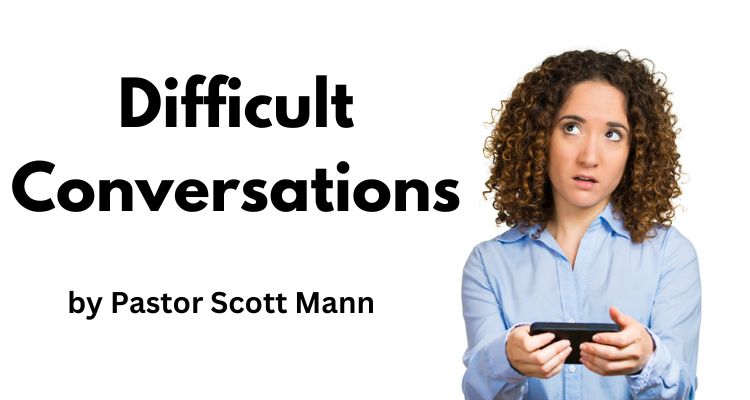Difficult Conversations

by Pastor Scott
Have you ever had a time when you have wanted to avoid a conversation with someone because you just knew it was not going to go well? Maybe it was something that hurt you or aggravated you, maybe it was something that concerned you yet you felt it didn’t bother the other person, or so it seemed.
Proverbs 15:1 gives us some good advice when times like these arise, “A gentle answer turns away wrath, but a harsh word stirs up anger.” In Hebrew the word for “gentle” in this verse is the word rak. Rak is used 16 times in Scripture and relates to the quality of being tender, soft or delicate in substance. Our “gentle answer” should soothe and comfort the one we are speaking with.
So often when conversations come up where we know we are most likely to be misunderstood, our minds go to a place that usually has only two goals in mind: to prove how right we are or to prove the other person is wrong. When those are our thoughts, we have strayed from the very basic practices of our faith. As disciples of Jesus, we are called to exercise emotional restraint by giving gentle responses rather than harsh or painful ones. When our responses become gentler, it enables us to turn away anger instead of stirring it up. This is something I personally need to work on.
So how do we walk this out practically? I have found three questions that may help with this.
1. What part of this issue can I own and apologize for? Often when conflict occurs, two people have two opposing narratives about the situation at hand. And usually there isn’t one person who is perfectly right or entirely wrong. I’m not talking about owning things that aren’t ours to take on. But if there is a part that’s mine, I don’t want to let pride keep me from doing what’s right.
Proverbs 15:18 reminds me: “A hot-tempered man stirs up strife, but he who is slow to anger quiets contention” (ESV).
2. How can I soften my heart toward this person so I honor them despite how they react?
Quite often the person with whom I’m having a conflict has some kind of past or current hurt in their life. Chances are, that hurt doesn’t have anything to do with me, but it’s adding to their emotional response in this conflict.
Softening my heart is easier if I can sympathize with them and if I lay down my pride, honor will be my reward. Proverbs 29:23 reminds us, “Pride brings a person low, but the lowly in spirit gain honor” (NIV).
3. Are there any necessary boundaries that may need to be implemented in this relationship?
If we continually find our emotions captured by repetitive conflicts or intense conversations in one particular relationship, it may be time to consider setting boundaries. Just remember, the intention of boundaries is not to push another away, it is help you stay together by defining what is and is not acceptable. We can do this all in a way that honors Jesus through displaying gentleness and kindness.
In the world we live in and especially during certain times, conflict is going to happen. But there is a way to pursue relational health and honor God in the middle of it all. I believe better reactions will lead to better conversations, better conversations will lead to better relationships, and better relationships will lead to better living.
Pray that our Lord God will help us all to take a moment to pause and allow the power of the Holy Spirit to intervene when we are about to react in ways that do not bring glory to God. And pray that when we are caught off guard, that God’s love and patience will spill over into our hearts so that we love others as God has loved us.
James 3:17, “But the wisdom that comes from heaven is first of all pure; then peace-loving, considerate, submissive, full of mercy and good fruit, impartial and sincere.” (NIV)
In Jesus’ name, Amen.
Pastor Scott Mann
Recommended Posts
Pursue Godly Vision
July 07, 2025
Deliverance
July 07, 2025
Take God on Vacation!
June 04, 2025
